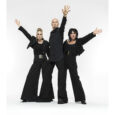IF YOU LOSE YOUR SPARK FOR LIFE, CAN YOU EVER GET IT BACK
A CONVERSATION WITH KATE NASH
Kate Nash is most known for “Foundations” from her debut album, Made of Bricks, which made her a household name in the UK. She followed that up with the critically acclaimed My Best Friend Is You, and then experimented with different musical styles with Girl Talk and Yesterday Was Forever. Her latest album, 9 Sad Symphonies, is her first album in six years.
“I hope that it can be comforting and hopeful, make them smile, and make them feel wrapped in love, and the string arrangements can make them feel emotional and uplifted because depression is very isolating, boring, and sad,” says Nash. “I think music is a great cloak when you feel that way and I hope my album can be a great cloak to people that need comfort.”
9 Sad Symphonies marks a return for Nash to a studio label after her former label dropped her when she wanted to pursue punk and experiment musically with Girl Talk. Girl Talk and Yesterday Was Forever, were released independently with the help of crowdfunding. “I definitely realized I had some trust issues for good reasons, but I think that Kill Rock Stars are such an amazing label,” says Nash. “They have such an incredible punk history, so I felt like I was connecting with like-minded people. I knew I wanted to have a team again, and I had to completely clear shelves. I didn’t have an agent. I didn’t have a manager… I love working with them. I think they’re so attentive. They listen to me. I feel respected. I feel like they’ve signed me for the right reasons, as in they’re not the kind of label that was signing me because they want me to make specific-sounding records.”
Nash and producer Frederik Thaae previously worked together on some songs from Yesterday Was Forever and Nash’s musical, Only Gold, and loved working together. They wanted to do a full record together and pursue something softer and more beautiful sounding. “We set ourselves these parameters to do something specifically different and then we just started doing sessions back and forth,” states Nash. “It was awesome. It was frustrating at times not being in the same country, but I also think limitations can be really interesting and can create something unique that you wouldn’t have made otherwise.”
“Millions Of Heartbeats” was originally a completely different song, until Frederik Thaae put it on the piano. “Immediately, I knew it was the start of the album,” says Nash. “It just sounds like the beginning of a musical… I completely scrapped the lyrics apart from the chorus. But the whole feel of the song is different. I sat with the music and really listened. Sometimes, with songwriting, you want it to be a certain way, but it’s not what best fits the song. You have to serve the song… I wanted to capture the feeling of this loss of spark for life and encounter with depression, not knowing does it come back. If you lose your spark for life, can you ever get it back? … It’s a bit like getting a broken heart, and you don’t know if you’re gonna love again. It’s quite a scary feeling… But having hope to keep trying cause you have to just keep trying.”
“These Feelings” was written about the confusion of depression and a certain area in Griffith Park in L.A. “It really helped me in the depression,” says Nash. “There’s this one little area where you would come up this slope and there was this view: a slope down and these purple rocks and a mountain behind it. It looked like a painting. I took so many pictures of that little view… You just watch nature and stuff happens, and that is a reassuring feeling when you feel purposeless because you don’t question nature, but you do question yourself as a human, and what’s my purpose? What’s the point of me? … I don’t question the repetition of nature, so it was like trying to connect to that, like realizing as a human, I am part of nature, and that’s kind of the answer. That’s what’s going to reassure me when I lose that sense of purpose.”
Reflecting on “Wasteman” Nash remarks, it’s a fun song for looking back; so much of a past relationship was so much about the other person and their drama and then being able to be in a better place and playful with it. I feel like I was so worried about the other person before that I didn’t get to say, ‘fuck you,’ and now I can because now I’m not invested in it.”
Throughout her career, Nash has seamlessly woven heartbreak and witty one-liners together. “I think it’s natural to me to make jokes like that in my songwriting because I don’t only like to be sincere,” says Nash. “One of the most important things in my life is laughing. Laughter, I think, is literally one of the most important things in the world. When you laugh with someone; family, friends, lovers, work colleagues, that is the thing that really connects us I think as people. Laughter and humour is so important to me, and I cut kind of anything that is painful or if I’m embarrassed, like, I love this person, and I’m embarrassed, and I have to joke to break the ice. Or, cut it with humour to make life bearable because life is painful.”
Nash’s debut album, Made of Bricks, was a smashing success and turned her into a massive pop star at a young age. “I enjoy what my career is now so much more,” remarks Nash. “I had a lot of fun, but fame is so weird, and I don’t love celebrity culture. Growing up as an 18-year-old in the UK. The UK media like to rip people apart, especially young people. I don’t enjoy the feeling of being watched and photographed in terms of paparazzi… I realized quickly for me, it was about the music, creativity, teams, work, projects, and albums… I’ll stand in front of 25,000 people happily, but I don’t like the celebrity intrusion. I’m not interested in it.”
Early on in Nash’s career, tabloids would often write hurtful things about her appearance. “You can belittle a woman by saying she’s not fuckable, that she’s ugly, that she doesn’t matter because of her looks, and she’s old, and she’s fat, and she’s wrinkly, and she’s not perfect, anything can be wrong with you. It’s just misogyny, and women are actually awesome, and ugliness is actually really cool. Like being a human being and sweating… that’s so interesting and being like a fucking porcelain doll is not interesting. It’s a nice toy, but it’s not a life. I just reject it. I like the ugliness. I don’t like real ugliness in people because real ugliness to me is people being mean, cruel, non-empathetic, or evil. But ugliness as a human shape, I kind of think in just in character and human body; everyone is kind of ugly. I mean, we can all be beautiful and all be ugly. We can all feel like, ‘I’m feeling really good today’ and sometimes be like, ‘I feel like a goblin.’”
Nash believes social media has made things worse. “I think that because of social media, everybody thinks they’re a fucking critic. Everyone loves to comment and give feedback to things that they really don’t need to get involved in. The last few years have gotten fucking crazy on social media. Comments are insane! If you’re not commenting on something positively or legitimately making a complaint about something serious, then what the fuck are you doing. And even then, write a letter or make a phone call. Stop commenting! … And I feel like people are so fucking critical of young women, and Chappell Roan, as an example, has been getting this media thing in she’s outspoken, and she responds to critique, and the media makes clickbait out of it…. I think comments need to be fucking switched off, and I think people need to fucking stop giving feedback when they don’t need to be giving feedback… There are ways to complain and take action, and I think that’s more like making phone calls, writing a letter, and speaking directly to people that make decisions, not like fucking bitching at young women all the time. Just fucking leave women alone!”












